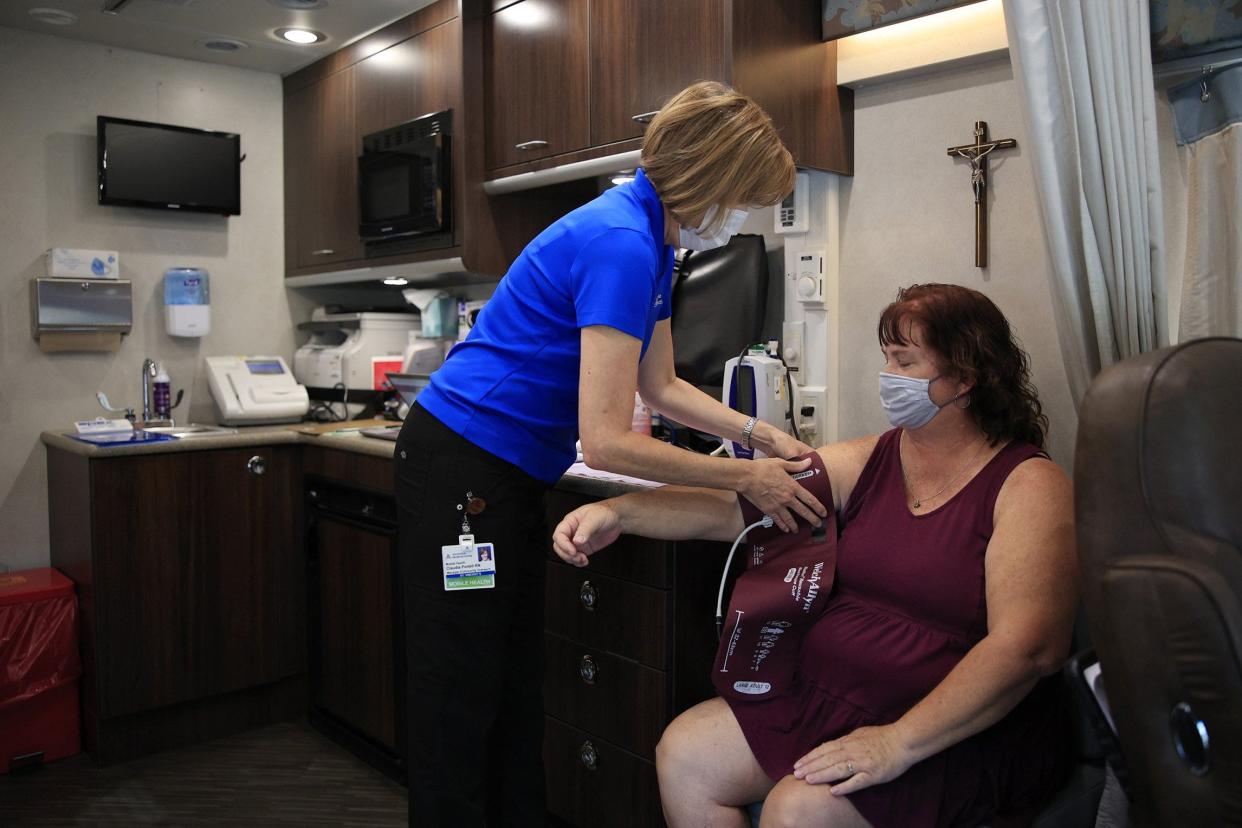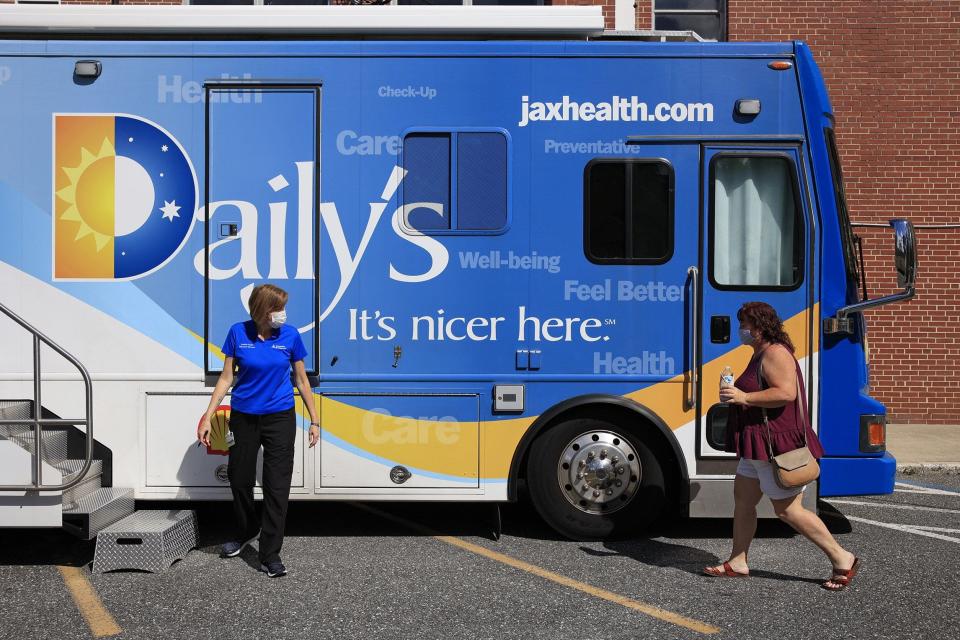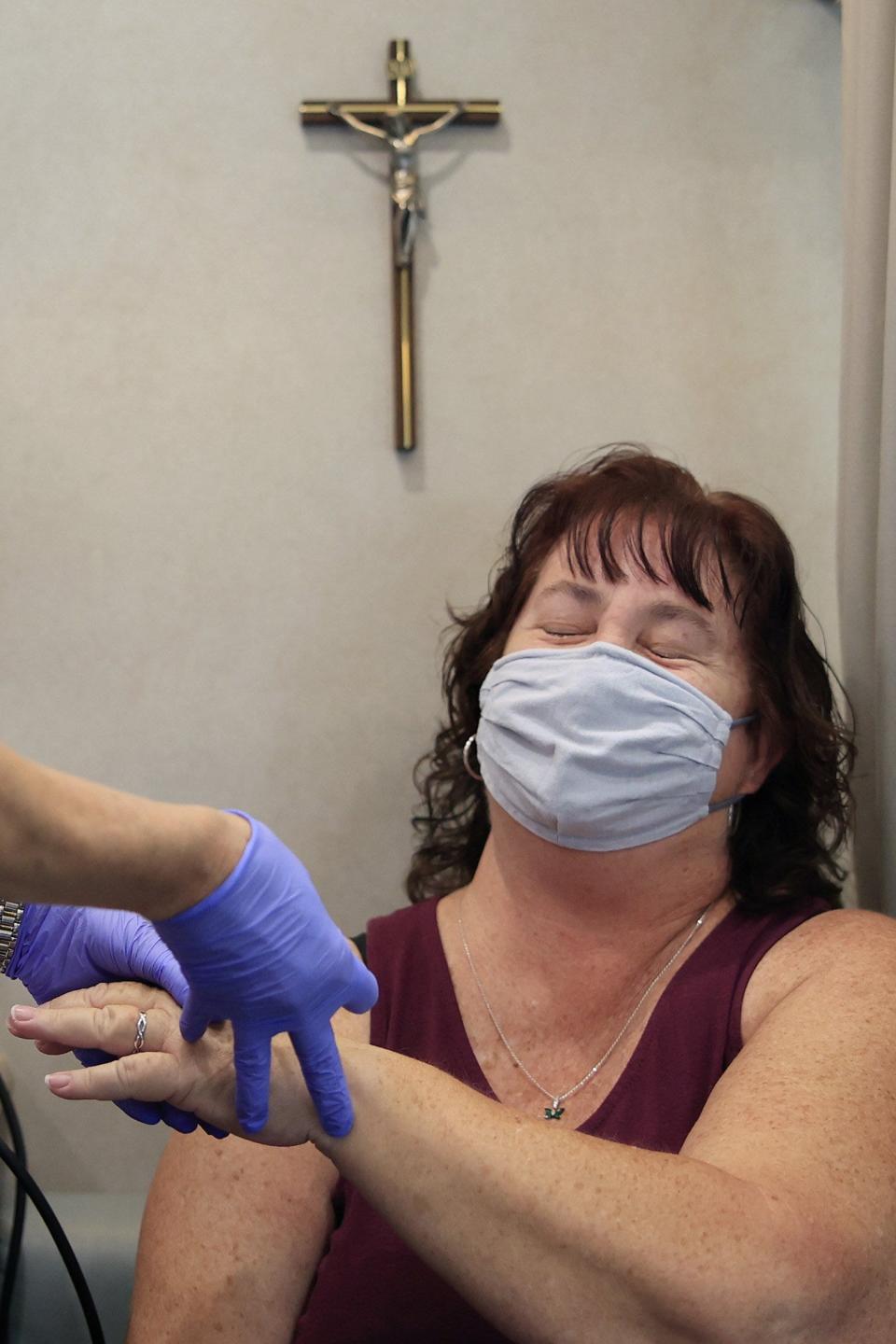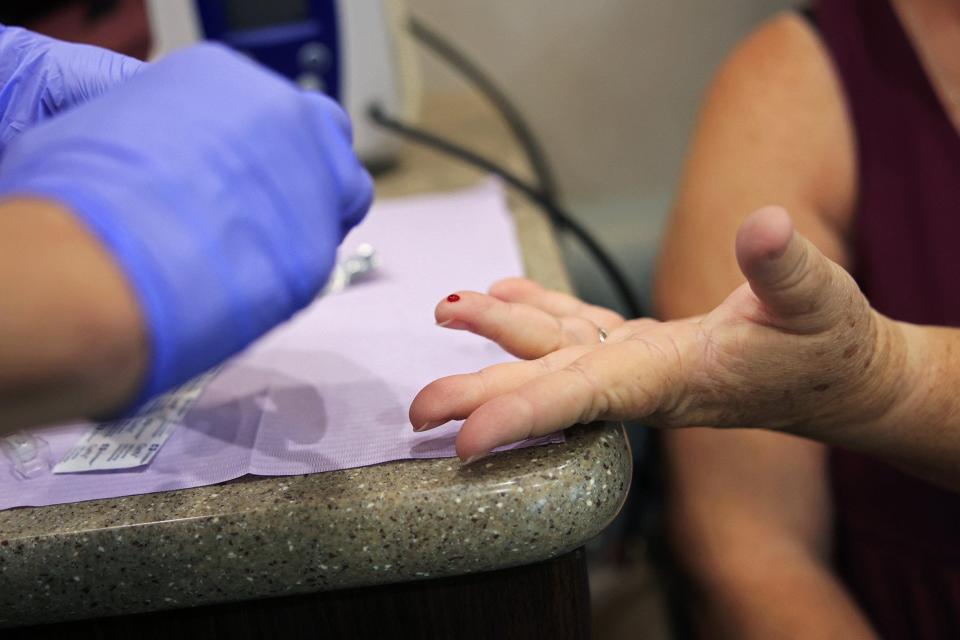Health care in an RV: Hospital's mobile ministry is on the road to help end health disparities

About 30 years ago Ascension St. Vincent's began a mobile health outreach to provide free medical care for migrant farm workers in St. Johns and Putnam counties.
Organized by the Daughters of Charity that founded the hospital, a small, dedicated group traveled from site to site in a used mini-van.
Since then, the Mobile Health Outreach Ministry has expanded its footprint — adding Duval, Clay and Nassau counties — and its mission becoming a key player in regional efforts to combat health disparities.
Community health assessment: Nagging issues, inequities, opportunities for action revealed in Jacksonville area
Cultural competence in health care:New Black-owned women's center pledges to 'put biases to the side'
Now five fully equipped and staffed recreational vehicles serve uninsured, underinsured and low-income families in the five-county area with free programs for adults, children and seniors. Adult dental services also are provided by volunteer dentists.
The units provide most primary care services that could be obtained in a doctor's office, including exams, management of adults' chronic conditions, laboratory services, school and sports physicals and immunizations.

And by being mobile, the ministry overcomes those Northeast Florida populations' primary barrier to health care access: lack of transportation.
"The goal is serving the most vulnerable," said registered nurse Claudia Portell, community outreach manager for the ministry. "Making that care accessible."
No other area hospital or nonprofit offers a free mobile health care program that is as geographically widespread and comprehensive as that offered by Ascension St. Vincent's, according to area health care representatives. .
Mobile clinics address health care barriers
Nationwide there are at least 2,000 mobile health clinics, with a combined 7 million visits annually, according to Mollie Williams, executive director of Harvard Medical School's Mobile Health Map, a collaborative research network of mobile health clinics.
Such clinics are in all 50 states, in urban, suburban, and rural communities, funded by philanthropy, state and federal grants and insurance reimbursements, she said.
According to a recent Mobile Health Map report, they are helping health care organizations tackle health equity and manage costs.
"The COVID-19 pandemic shed light on fundamental problems with the health care system, including gaps in access to care, soaring costs, provider burnout and a lack of trust, especially among underserved and marginalized communities," according to the report. "Mobile health programs provide a community-based, high-value and sustainable solution."
Williams, who co-wrote the report, said mobile clinics address the transportation barrier and many other factors that limit access to health care.
'Concerted effort' needed:Jacksonville's deep-rooted health disparities can impact lifetimes
"People struggle to gain access to health care for logistical reasons … and financial barriers," she said, citing travel time, lack of reliable transportation, clinic hours, wait times, as well as high deductibles and lack of insurance and paid sick leave.
Another barrier is lack of trust in the health care system.
"Mobile clinics go to where people live, work, play and pray," Williams said. "By going to the community and building relationships with local organizations and residents, mobile clinics foster trust, respect and connection."

The pandemic made barriers to health care even higher. People lost jobs and insurance. Misinformation, frequently changing safety guidelines and the "politicization of masks and vaccines" worsened the distrust, she said.
"Mobile health clinics are designed to become immersed in these communities by fostering relationships and meeting people where they are, not dictating their health care to them," Williams said. "By integrating into communities in this way, mobile health clinics are uniquely situated to improve equity."
States should use mobile clinics to expand rural health care access, according to the Center for American Progress, an independent, nonpartisan policy institute. They are cost-effective because they can significantly reduce expensive hospital emergency department visits, among other things, according to the center's February report.
"Despite these benefits, mobile clinics face significant financial barriers to operation," the report said. "For most of the country, mobile clinics are funded through private donations as opposed to state funds … [which] further contributes to the lack of mobile clinic expansion."
Victoria Nelson recently visited an Ascension St. Vincent's mobile clinic during a stop at Lakeshore Baptist Church in Jacksonville, 10 miles from her home. Ease of scheduling is a key benefit of the unit, she said.
"You can usually plan way in advance to be here, they'll work with you," Nelson said. "This was the closest one to my house."
'Eye-opening experience' for staff
From July 1, 2021, to June 30, 2022, the St. Vincent's mobile clinics provided about 8,400 medical services for about 6,500 separate people, according to Portell. The program has 18 staffers, some full-time, some part-time, and each clinic has a team that includes a medical provider, three nurses and a commercial driver who also helps with patient check-ins. Bilingual staffers are available.
"We started out small," she said. "Over time, the program really has grown."
The schedule features mostly regular stops, such as senior housing facilities and low-income neighborhoods, and other stops that vary depending on needs.
"We try to operate so patients can learn … where they can come to access care," she said.
We Care Jacksonville: Website launched to connect Jacksonville's uninsured to health care
Part of Ascension St. Vincent's for 24 years, Portell has run the mobile ministry for five years. She takes shifts herself to keep her hand in nursing.
"I love to get out on the mobile unit," she said. "It's a real 'feel-good' thing. … That desire to serve. I take the mission very seriously."
And the mission becomes very clear on a mobile clinic shift.
"Before, I had a little bit more of a sheltered existence," Portell said. But clinic staffs see the real-time impacts of "lack of access to health care, to basic necessities like food and shelter," she said.
"It is an eye-opening experience to see the disparity that exists," she said. "It is meaningful work."
Gap of specialist care still exists
Ascension St. Vincent's Foundation and its donors fund the mobile clinics as part of the hospital's commitment to "provide compassionate, personalized care to everyone, with special attention to those who are struggling the most," said Virginia Hall, the foundation's president and chief development officer.
The clinic staff "has done this by physically meeting the most vulnerable members of our community right where they are," she said. "We know that the Mobile Health Outreach Ministry has truly helped people in our community because they tell us how impactful the care we provide has been in their lives. It means the world to me to know that we’re making a difference in the lives of people in our community who may otherwise not have access to the care they need."

The foundation's support has been critical, according to Portell, as has collaboration with other area entities with similar missions.
"We can't meet everyone's needs," she said. "Each community has different challenges."
Health care: Jacksonville nonprofits hope to connect more uninsured residents to primary care
Still, a medical care gap exists for vulnerable populations: access to free specialist care such as cardiologists and oncologists.
In Duval County, We Care Jacksonville connects uninsured patients to a network of free and charitable clinics and, when necessary, to specialty physicians. But no such programs exist in the other four surrounding counties.
Also needed are volunteer dentists to help with the clinics' dental offerings, Portell said.
Even with the gaps, St. Vincent's mobile ministry is providing care for thousands of people who would not otherwise get it. And it comes at a bargain.
The program's budget is about $1.5 million, she said. If those patients had to purchase the services individually from brick-and-mortar facilities, the total cost would have been $2 million to $2.5 million.
"That's the value of the service," she said.
bcravey@jacksonville.com, (904) 359-4109
Ascension St. Vincent's mobile health outreach ministry
For more information call (904) 308-7911 or go to healthcare.ascension.org/locations/florida/fljac/jacksonville-ascension-st-vincents-riverside/outreach-ministries. To donate, contact the Ascension St. Vincent's Foundation at 1 Shircliff Way, Jacksonville 32204; (904) 308-7306; thefoundation@ascension.org, or go to givestvincents.org.
This article originally appeared on Florida Times-Union: Jacksonville hospital's mobile ministry provides health care

